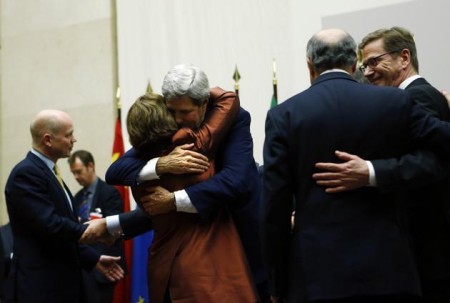PHOTO: Celebration of signature of November’s interim nuclear deal
Below a surface of tension and some harsh rhetoric inside Iran, the nuclear talks between Tehran and the 5+1 Powers (US, Britain, China, Russia, France, and Germany) are quietly advancing.
Experts from the two sides held three days of technical talks in Vienna, followed by Monday’s opening of the third round of high-level negotiations.
This round of discussions, scheduled to last until Wednesday, is expected to move from the agenda established in the two sets of talks since February to consideration of the items. Key issues are expected to include the number of centrifuges that Iran can operate in a nuclear program, status of facilities such as the Fordoo uranium enrichment plant and the Arak heavy-water reactor, provisions for inspections and supervision, and the lifting of US-led sanctions.
Both Iran and the US expressed hope this week that a draft text of a comprehensive agreement could be produced by May.
The six-month interim deal is due to expire on July 20.
Away from the talks, the Iranian public was gripped by the story of five kidnapped border guards, seized in southeastern Iran and held in Pakistan for two months by the Sunni insurgency Jaish ul-Adl. One of the men was executed in late March, but the other four were released on Friday. Details of any deal between the insurgents and Iranian authorities were not released.
President Rouhani continued to face pressure from hardliners, including an intervention by the Revolutionary Guards on the nuclear talks; however, his critics appeared to be quieter with the advent of the next round of nuclear talks.
Instead, MPs, clerics, and officials turned their fire on the European Parliament, who dared to express grave concern over the human rights situation in Iran. Legislators called on the Rouhani Government to suspend political and economic relations with any European country which signed the resolution.
FORECAST
This week’s nuclear talks are not only significant for Iran’s relations with other countries, but for the future of the Rouhani Government. Signs of progress will continue to ensure the Supreme Leader’s backing — essential protection against hardliners — for the negotiators. Any sign of difficulties, or threats of punishment by an outside force such as the US Congress, will lead to more pressure on the President.
Advance in the talks will also push aside displays such as the flare-up of hostility towards Europe. Failure to get advance towards another round, with a draft of a comprehensive agreement, will shake nerves in an Iran which is jittery about economic concerns and the security issues raised by the case of the border guards.
FEATURED ANALYSES/h3>
Video Analysis: Kidnapped Border Guards & The Fight at Home and Abroad
Iran: “Hey Y’all” — Tehran’s Soft Power Takes on Southern US Accent

